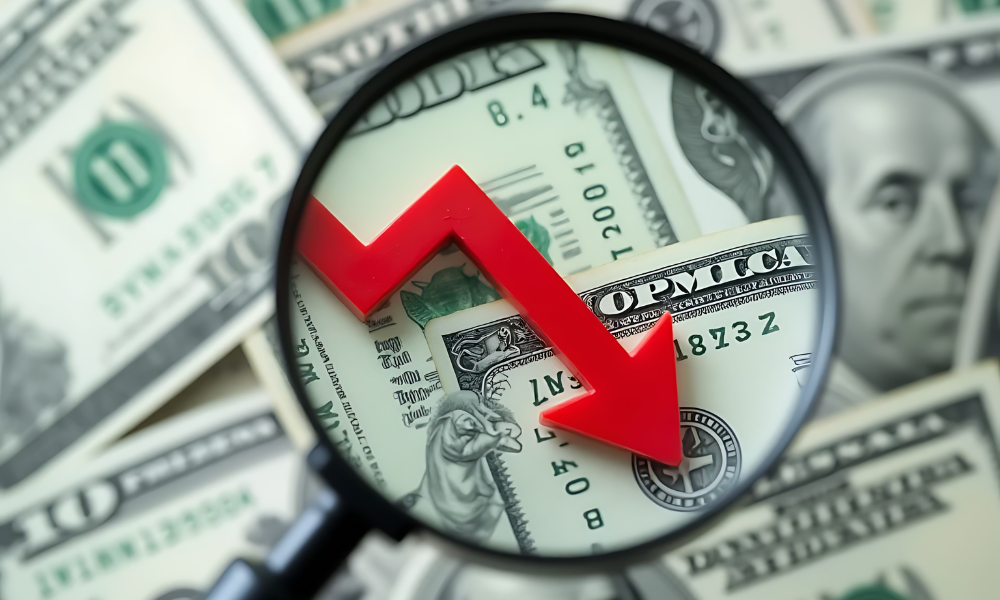

by Tian Chen and Matthew Burgess
Asian currencies ripped higher against the US dollar Monday, extending a move that’s hurting exporters, weighing on equities and forcing central banks to intervene in the market to curb excessive gains.
Taiwan’s dollar surged the most since 1988, sending the nation’s benchmark stock index to its steepest slide in nearly a month. The offshore yuan climbed to its highest level in almost six months as exporters repatriated dollar earnings. The Hong Kong dollar held at the strong end of its allowed trading band for a second session. Meanwhile, the Indonesian rupiah recouped most of this year’s losses after slumping to a record low less than a month ago.
The volatility shows how an exodus from the world’s reserve currency can ripple through financial markets, as President Donald Trump’s shifting tariff policies fuel concern over a US recession. Last week, speculative traders became more bearish on the dollar than at any time since September, in a sign of growing reluctance among investors to hold US assets.
Asian currencies including the yen and yuan are benefiting from a mix of repatriation buying and as alternative investments amid the “sell America” wave. The strategy appeared to remain intact even as both Beijing and Washington seemed to be softening their stance on the trade war, with President Trump at the weekend signaling he’s open to reducing import duties on Chinese goods to spur trade.
“The natural way out of a lot of this trade tension is via the dollar balloon deflating,” said Brad Bechtel, global head of foreign exchange at Jefferies. Therefore, “loading up on a little downside for dollar versus Asia might make sense.”
Asia’s foreign-exchange market has seen wild swings the past two days, with a Bloomberg gauge of the region’s currencies surging the most since 2022 on Friday, while an indicator for returns of emerging-markets foreign-exchange closed at an all-time high. Moves extend on early Monday trading, with the Asia Dollar Index at its highest in six months.
Strength in emerging market currencies can help attract foreign inflows and make its imports cheaper, but it can hurt exporters by making their goods less competitive globally.
Exporters’ Selling
Taiwan dollar jumped about 5% on Monday, leading a two-day rally in regional currencies. The gain was driven by speculation that exporters and retailers were aggressively selling the greenback, betting on further declines. The surge in currency exchange requests prompted Cathay United Bank to place controls on its trading platform.
Friday’s surge prompted the Taiwanese central bank to say it intervened in the market and also asked foreign investors and large exporters to delay selling dollars. The central bank, which typically smoothen sharp currency moves, appeared to be abstaining from intervention Monday, fanning speculation of a trade deal that may involve the local dollar, according to BNP Paribas.
“Currencies with the largest external surpluses are more exposed to fears of a ‘Plaza Accord 2.0,’ and TWD is at the top of this list,” said Ju Wang, head of Greater China FX & rates at BNP. “Local exporters are panicking, and local lifers are under-hedged, while equity-related outflows have ceased.”
Similar to their Taiwanese peers, Chinese exporters also no longer see the dollar or Treasuries as a viable shelter amid trade conflicts. They have been shifting their strategy of hoarding dollars and are preferring the yuan instead, a Bloomberg survey showed.
Elsewhere in Asia, Malaysian ringgit soared more than 1%, while the Singapore dollar also gained. China’s onshore market was closed for holidays and will reopen on Tuesday.
Traders were on watch for further currency intervention, particularly in Hong Kong after the local dollar tested the strong end of its trading band between 7.75 and 7.85 per US dollar for a second day. On Friday, the city’s de-facto central bank bought HK$46.5 billion ($6 billion) worth of the greenback — the most on record for such an operation — to weaken its exchange rate.
Asian currency appreciation was also driven by investors reallocating funds away from the dollar. Last month, the greenback slumped along with long-dated Treasuries and US stocks due to concern that Trump’s tariffs might stoke inflation, hurt the economy and prevent the Federal Reserve from cutting interest rates.
“With the dollar under pressure, and the risk of lower rates given elevated recession risks in the US, the risk and reward of maintaining dollar deposits looks markedly different for Asian exporters,” Goldman Sachs Group Inc. analysts led by Kamakshya Trivedi wrote in a note. Currencies including the yuan, Taiwan dollar and ringgit will likely advance.
Copyright Bloomberg News

Rajesh Markan earlier this year pleaded guilty to one count of criminal fraud related to his sale of fake investments to 10 clients totaling $2.9 million.

From building trust to steering through emotions and responding to client challenges, new advisors need human skills to shape the future of the advice industry.

"The outcome is correct, but it's disappointing that FINRA had ample opportunity to investigate the merits of clients' allegations in these claims, including the testimony in the three investor arbitrations with hearings," Jeff Erez, a plaintiff's attorney representing a large portion of the Stifel clients, said.

Chair also praised the passage of stablecoin legislation this week.

Maridea Wealth Management's deal in Chicago, Illinois is its first after securing a strategic investment in April.
Orion's Tom Wilson on delivering coordinated, high-touch service in a world where returns alone no longer set you apart.
Barely a decade old, registered index-linked annuities have quickly surged in popularity, thanks to their unique blend of protection and growth potential—an appealing option for investors looking to chart a steadier course through today's choppy market waters, says Myles Lambert, Brighthouse Financial.
